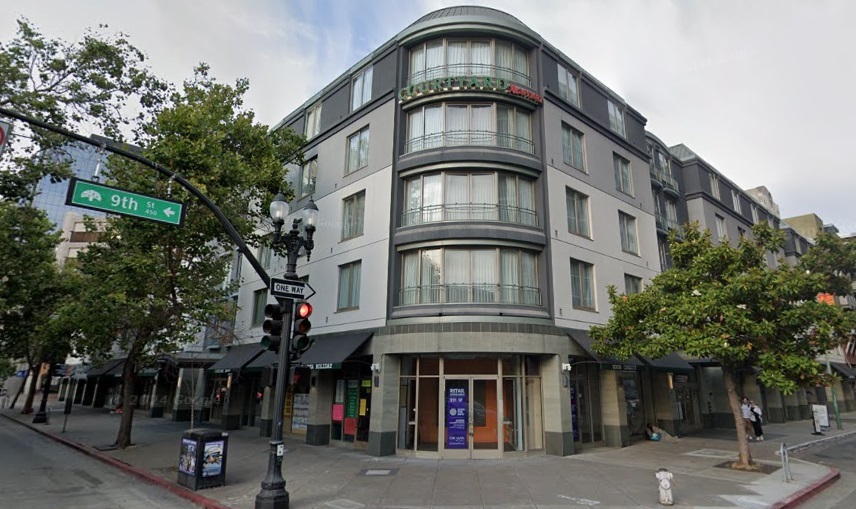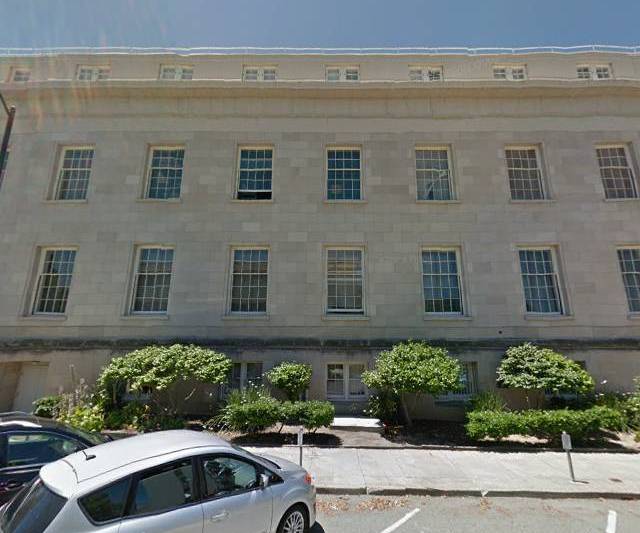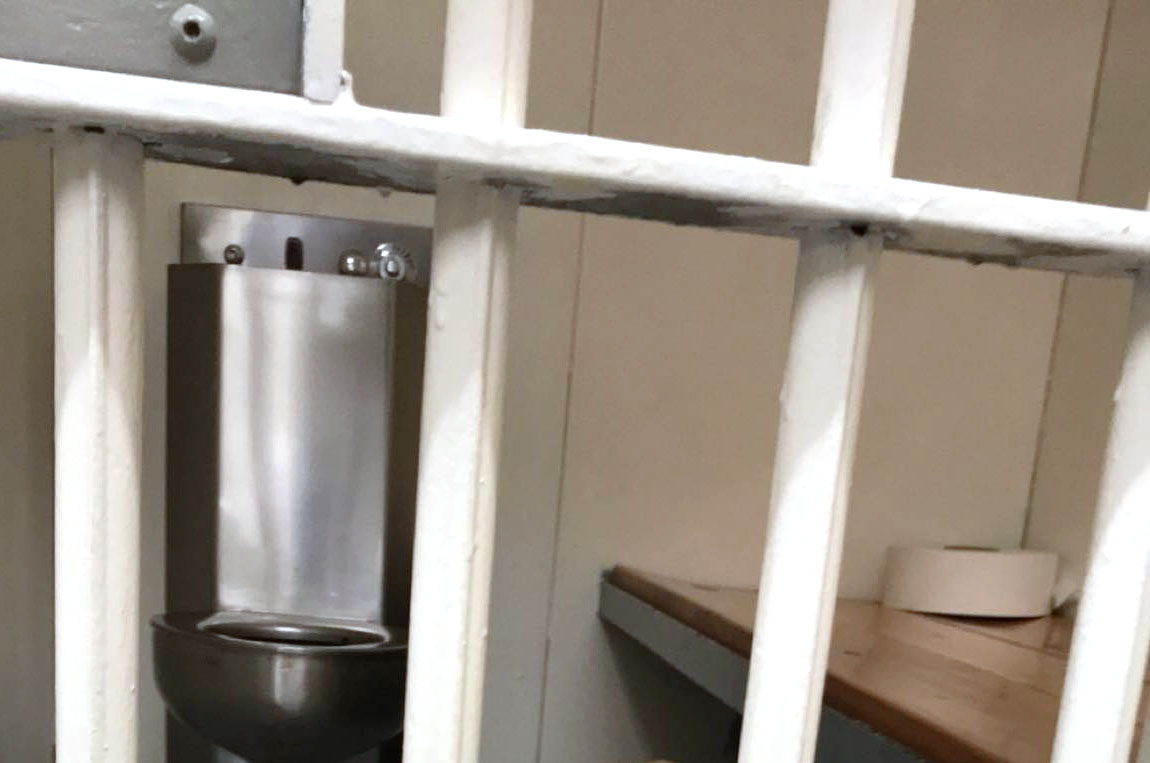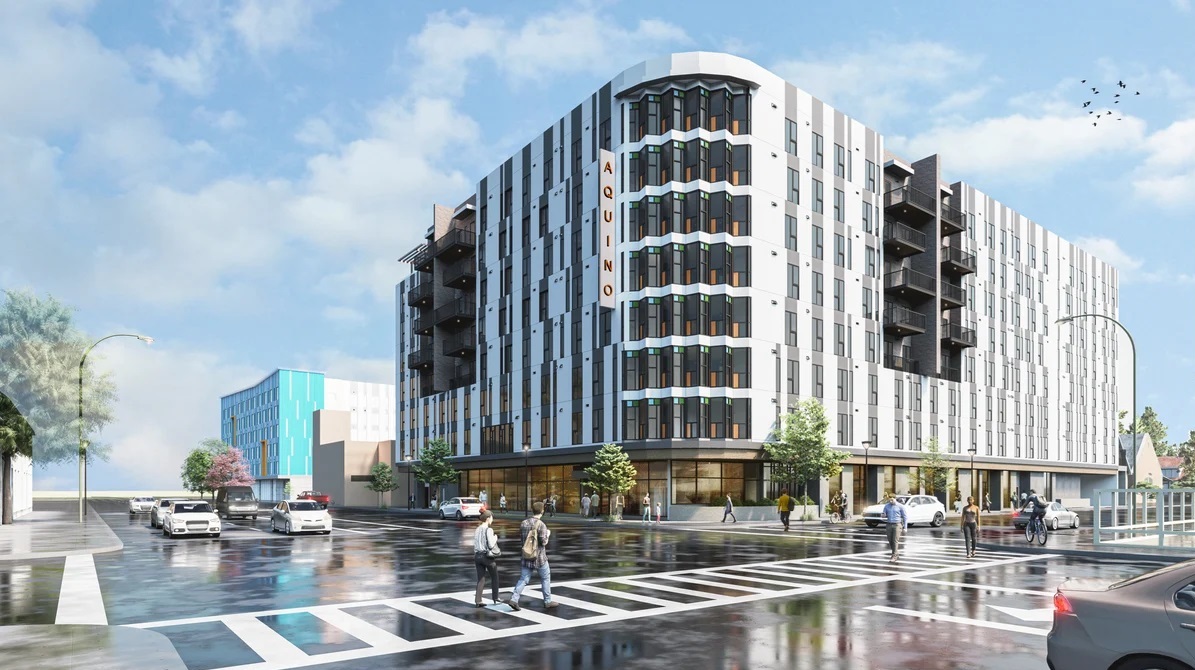OAKLAND — Days before the city was expected to give its approval for a large homeless shelter to be built in Chinatown, the proposed deal is dead.
Local nonprofit Cardea Health was lined up to run the “interim housing” site at the Courtyard Marriott on Broadway, a $20 million real-estate deal that would convert the hotel into 150 shelter beds for those experiencing homelessness.
The hotel was sold last year for $10.6 million, a value that took a nosedive in recent years amid the local hospitality industry’s decline.
But business leaders in Chinatown successfully lobbied their new city council member, Charlene Wang, whose district includes the downtown neighborhood, to pull a planned letter of support from next week’s council agenda.
“To be frank, this is a perfect example of institutional racism,” Wang said in an interview about the nixed hotel-to-housing proposal. “You’re placing a shelter right beside this vulnerable population.”
City leaders now have two weeks to endorse an alternate shelter site in Oakland, where crime fears and a battered economy have fueled contentious politics among Chinatown residents in the years since the COVID-19 pandemic.
Disputes over where homeless shelters can be built are commonplace around the Bay Area, where public opinion leans heavily against tolerating encampments but short-term housing solutions are proving to be difficult to sustain.
Alameda County, which has just freed up $150 million from the Measure W sales tax increase, intends to fund interim housing in each of its incorporated cities. The county will provide $10 million to each approved vendor that steps forward to operate a shelter.
Cardea Health CEO Dr. Alexis Chettiar said the converted Courtyard Marriott site would have been equipped with 24/7 security, with no cost to the city budget. She estimated the city would save $1 million on police and fire response to homeless encampments.
Truck driver Merlin Rivera delivers produce to Chinatown businesses in Oakland, Calif., on Friday, April 18, 2025. (Ray Chavez/Bay Area News Group)
“We are sorry that it will not be moving forward,” Chettiar said in a statement, “and hope that there will be a future opportunity for the site to provide needed services for the greater Oakland community.”
Leaders at the Chinatown Chamber of Commerce pushed hard for the city to renege on its planned support for the shelter, warning in a statement that the site would “directly impact” the district’s various cultural institutions, plus its schools, senior centers and merchants.
But in an interview, chamber President Stephanie Tran limited her criticism to how the real-estate deal was being negotiated: “behind closed doors.”
“We oppose this homeless shelter due to the lack of engagement and community input and transparency,” Tran said. But she offered little clarity about the chamber’s broader statement, noting instead that “Chinatown is not anti-housing.”
Wang, the council member, spoke more plainly. The proposed site, she explained, would have stood opposite a residential high-rise with over 300 tenants, many of whom are “not high-income people, but mostly Medi-Cal covered elders.”
So she “did some probability” in her head, leading to a prediction: someone from the “mega-shelter” may physically assault a tenant in the neighboring apartment building.
“These are people just taken off the streets from an encampment who are likely to have serious mental-health or drug-addiction issues,” Wang said. “An interaction could result in someone being seriously harmed, like manslaughter.”
Newly elected Oakland City Councilmember Charlene Wang arrives at her swearing-in ceremony at City Hall in Oakland, Calif., on Tuesday, May 19, 2025. (Dai Sugano/Bay Area News Group)
“I know most unhoused people won’t be in this situation,” she added, “but you do the permutation math problem — it only takes 1 out of 300 people for something to happen.”
A rise in crime during the pandemic’s worst years has driven leaders of the small business district to demand more politically moderate governance, including a special Oakland Police Department detail that raked in overtime pay to patrol the neighborhood’s streets.
The area does have its share of supportive housing, including over 30 single-room occupancy units that can be rented for under $300 per month at the Madrone Hotel, a city block away from the Courtyard Marriott.
A local nonprofit, the East Bay Asian Local Development Corporation, oversaw the Madrone housing and several other affordable sites downtown.
Late last year, it led a still-pending effort to rename the Lake Merritt BART Station after Chinatown, a “great validator that Chinatown is a historic and current place,” the nonprofit’s director, Sharon Lai, said in an interview.
Chamber executives, meanwhile, are quick to point out that metro cities will often shovel unfavorable or controversial developments toward Chinatown districts, away from more affluent or suburban neighborhoods.
OAKLAND, CA – JANUARY 13: BART ambassadors Brandon Fenwick and Frank Dan, from right, walk the platform at the Lake Merritt Station in Oakland, Calif., on Wednesday, Jan. 13, 2021. The ambassadors are unarmed civilian employees of the police department who help keep riders safe aboard trains. (Jane Tyska/Bay Area News Group)
Last fall, the Philadelphia 76ers abandoned plans for a $250 million apartment tower next to the basketball franchise’s arena after a city leader likened the development to a “middle finger” to the city’s Chinatown, which would have neighbored the apartments, CBS reported.
And in a Chinatown across the bay from Oakland, business owners successfully lobbied last year against a “sober housing” facility, which, the San Francisco Standard reported, was intended to permanently house formerly homeless residents recovering from drug abuse.
“Chinatown has gone through a lot of past trauma,” Lai said, though she added that the community remains “part of the housing solutions.”
Oakland officials are still seeking vendor applications for interim-housing proposals over the next couple weeks as Alameda County prepares to distribute millions of dollars in Measure W funding.
Chettiar, the Cardea Health CEO, said the nonprofit was “eager to consider” alternate sites Wang proposed, but determined that the properties in question were either in poor condition or did not meet safety standards.
Wang, for her part, is now speaking to other vendors about areas in her district — which, along with Chinatown, includes Jack London Square, parts of downtown and neighborhoods south and to the east of Lake Merritt — where a shelter could be built.
“Especially with the possibility of putting shelter sites in Chinatown, or Little Saigon,” she wrote in a July 9 email to city staff, “I cannot stress more the importance of having a culturally competent provider.”
Shomik Mukherjee is a reporter covering Oakland. Call or text him at 510-905-5495 or email him at [email protected].





